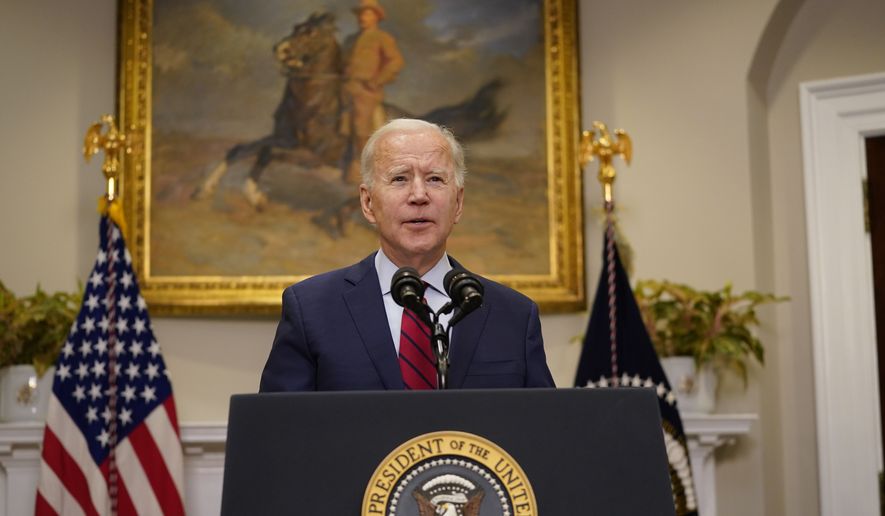OPINION:
“America is back. Diplomacy is back at the center of our foreign policy.” So said President Joe Biden addressing State Department employees in early February.
But is it? Certainly, Biden favors diplomacy with some countries. Two weeks after his speech at Foggy Bottom, Biden meandered through video remarks to the transatlantic foreign policy elite who typically assemble at an annual self-appreciation gala in Munich. Ludicrously, he said, “The partnership between Europe and the United States, in my view, is and must remain the cornerstone of all that we hope to accomplish in the 21st century, just as we did in the 20th century.”
If so, we are in trouble. Old Europe is, at best, a geriatric facility for yesteryear’s statecraft. Opting for decadent decline over standing up for Western values and modernity, it has been largely irrelevant since the Soviet Union disappeared in 1991 and gets more irrelevant with the passage of time.
No amount of diplomacy with Brussels, Berlin, Paris or other capitals of Old Europe will induce the continent to help us seriously with China, whose capital and markets remain an appealing mirage to European planners who never learn from unrequited love. With Russia, Europe’s function is mainly to hype a threat that is serious but not critical, ensuring America will continue to underwrite European security, as it has for nearly 80 years, and even while Germany and France harm the U.S. economy with unfair trade barriers. They are content recklessly to push Russia into China’s arms.
What about the allies that matter — the ones that are relevant to the most serious threats the United States and the free world face today? Standing against China, the most crucial friends America has are Japan, Taiwan, Australia and Singapore. Thankfully, Biden has not yet antagonized these governments, although the time may come. The Obama-Biden administration devoted far more energy to China than Japan, twice gave thinly veiled endorsements to Taiwan’s (since discredited and defeated) pro-Beijing KMT party, and talked big about a pivot of military force to Asia that never actually happened.
Today, the occupants of the White House seem determined to resurrect the Obama-Biden legacy that left U.S. power in the Pacific weaker than when its namesakes entered office. And Biden foreshadowed new appeasement of China recently by justifying Beijing’s mass incarceration of Uighur Muslims in concentration camps as stemming from “different norms.” He also asserted “the time when China has been victimized by the outer world is when they haven’t been unified at home”—part of the mythology the Chinese Communist Party uses to justify its one-party tyranny.
But even that is not as advanced as the Democrats’ diplomatic malfeasance in the Middle East. There, emerging policy seems simple: ignore our allies and coddle our adversaries, especially Iran. Recently, Secretary of State Antony Blinken told those Europeans with whom the administration is doing so much diplomacy that the United States was willing to rejoin the 2015 Iran nuclear deal, which the Trump administration ditched. The deal doesn’t eliminate Iran’s nuclear weapons program — it sanctifies it, permitting advanced centrifuges that can produce the key ingredient in a nuclear weapon, and eventually removing all restraints on uranium enrichment and international monitoring.
Biden put an end to U.S. efforts at the United Nations to “snap back” into place some of the toughest sanctions on the terrorism-and-Islamism exporting nation. Biden also dropped the terrorist designation of Iran’s proxies in Yemen, the Houthis.
He did all of this in exchange for nothing, and before Wendy Sherman, author of both the original Iran nuclear deal and its Clinton-era prologue in nuclear appeasement of North Korea, arrives at the State Department as deputy secretary. Iran hasn’t agreed to talk but has just begun producing uranium metal, in violation of the 2015 deal, and promised to end international monitoring by summer.
Biden is also being either indifferent or hostile to the key allies that matter in the Middle East in confronting Iran and balancing increasingly anti-U.S. Turkey: Israel, the United Arab Emirates, and Saudi Arabia. Biden refused to speak with Israeli Prime Minister Bibi Netanyahu for nearly a month into his presidency and suspended multi-billion arms sales to Abu Dhabi and Riyadh, despite the global rarity of U.S. partners willing to pay for their own defense and the importance of the arms to deter Iran. The suspension also puts at risk U.S. aerospace jobs, cuts more than $23 billion from U.S. GDP and adds it back to the trade deficit.
With their brand of diplomacy, the Democrats have made cocktail parties in Old Europe great again. Meanwhile, the neglected, resolute allies that actually matter will face a tough choice between cutting deals with the bad actors in their regions or hoping for a return to real diplomacy from America.
• Christian Whiton was a State Department senior adviser in the George W. Bush and Trump administrations. He is a senior fellow at the Center for the National Interest and a member of the Nixon Seminar on Conservative Realism and National Security.




Please read our comment policy before commenting.